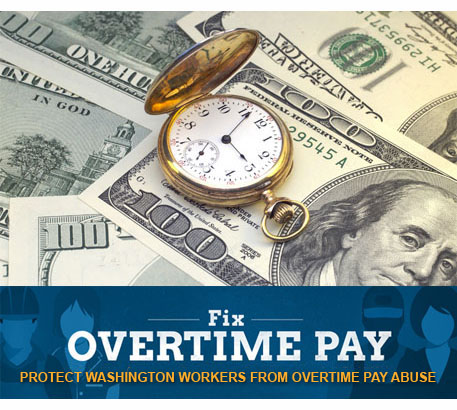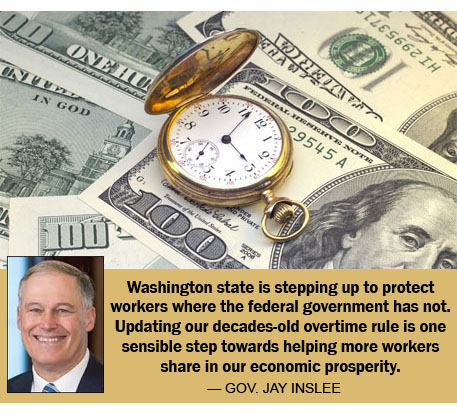STATE GOVERNMENT
Trump administration’s federal overtime proposal ‘way too weak’
DOL’s ‘insufficient’ plan raises urgency for state to restore 40-hour work week
 OLYMPIA (March 8, 2019) — The Trump administration announced plans Thursday to dramatically scale back an Obama-era rule to update the salary threshold for overtime exemption, increasing the urgency for the Washington state government to update its rules to restore overtime rights and help bring working families’ live back into balance.
OLYMPIA (March 8, 2019) — The Trump administration announced plans Thursday to dramatically scale back an Obama-era rule to update the salary threshold for overtime exemption, increasing the urgency for the Washington state government to update its rules to restore overtime rights and help bring working families’ live back into balance.
The U.S. Department of Labor has proposed to raise the threshold for overtime pay exemption from $23,660/year to just $35,000/year, meaning workers who make more than that can be declaried “exempt” salaried employees and forced to work additional hours beyond 40 per week for free.
The 2016 federal rule increased that threshold for the first time in decades to about $47,500 before it was derailed by a legal challenge from Republican state attorneys general and a federal judge in Texas. Had the Obama rule, which provided for automatic inflationary updates of the threshold, remained in place, the threshold would be $51,064 today and $55,000 in 2022.
A preliminary analysis suggests that millions of Americans — well over half of the workers who would have gotten new or strengthened overtime protections under the 2016 rule — will be left behind by Trump administration rule.
“The Trump administration’s proposal is way too weak and totally insufficient to restore the basic protections of the 40-hour work week,” said Larry Brown, President of the Washington State Labor Council, AFL-CIO. “Because the overtime pay protections have been allowed to erode for decades, millions of Americans have been forced to work longer and longer hours without extra pay. If everyone who makes just $35,000 per year can be denied extra pay, it’s like their time doesn’t count.”

“Workers are human beings with families, communities, and lives outside of work. Our time counts, too,” Brown added. “When employers have to pay more to get more time from their employees, it means more parents have more time for their children, more people have more time to pursue their passions, and more neighbors have more time for their communities. This is a quality-of-life issue.”
The good news: the Washington State Department of Labor and Industries (L&I) is expected to announce soon its own long-overdue update to state overtime pay rules, which would supersede the federal minimum. The state has already conducted pre-draft hearings on the issue and could restore overtime protections to hundreds of thousands of salaried workers in Washington state who have been denied the extra pay they should get for the extra hours they work.
In its “pre-draft” proposal, L&I did not propose a specific exemption threshold. Instead, the department offered a range of possibilities: between 1.5 and 3 times the state minimum wage, which works out to a range of about $37,500 to about $75,000 per year. Union organizations and their allies have called for the threshold to be raised to 2.5 to 3 times the minimum wage.
As recently as the mid-1970s, when the federal overtime pay rules were last updated, more than 60 percent of salaried workers received time-and-a-half pay when they worked extra hours beyond 40 per week. Now less than 10% do — and it’s not because people are working less. A Gallup poll finds that salaried workers are clocking an average of 49 hours a week — with some as many as 60 or more — and few are paid an extra dime for the extra hours they put in.
 “If an employer classifies a worker as exempt from overtime, that means the worker doesn’t get any extra pay no matter how many hours they are forced to work,” Brown said. “That not only disrespects the worker’s time and well-being, it is a disincentive for employers to hire sufficient staff to do the work.”
“If an employer classifies a worker as exempt from overtime, that means the worker doesn’t get any extra pay no matter how many hours they are forced to work,” Brown said. “That not only disrespects the worker’s time and well-being, it is a disincentive for employers to hire sufficient staff to do the work.”
Gov. Jay Inslee strongly supports updating the state overtime pay rules.
“Washington state is stepping up to protect workers where the federal government has not,” Inslee wrote late last year. “Updating our decades-old overtime rule is one sensible step towards helping more workers share in our economic prosperity.”
Working Washington, a statewide organization dedicated to improving wages and working conditions, writes today that this is about making sure workers’ time counts:
“The average salaried worker puts in 49 hours a week and doesn’t get paid an additional dime of overtime pay when they work overtime hours — but most salaried workers at food, retail, office, nonprofits, and other jobs aren’t looking for hundreds of hours of overtime pay. They’re simply looking to have their time back so they can be with their families, contribute to their communities, get some rest, and just live their lives. But they also know that the only way to get employers to respect their time is if they have to pay for it.”





